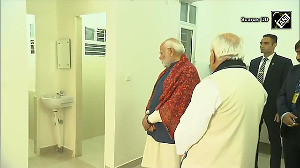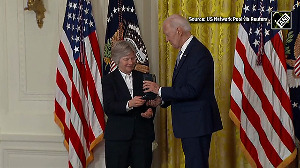Payal Kapadia's understanding of what it means to be a woman is as poignant as her authentic portrait of Mumbai's hoi polloi, observes Sukanya Verma.

Three immigrant women from different generations experience varying stages of disquiet against the ebbs and flows of Mumbai.
Caught in an endless grasp of loneliness and long-distance marriage, Prabha (Kani Kusruti) is on the cusp of longing and losing heart. Her husband's job in Germany has kept them apart for far too long. And then arrives his gift: A pressure cooker. Could it be more symbolic?
Parvati (Chhaya Kadam) fights the fear of displacement as builders breathe down her neck to vacate her modest home and make room for redevelopment by the privileged, for the privileged. Lawyers cannot help because, too often, dead husbands have not kept their wives in the know about their financial affairs.
Anu (Divya Prabha) is in love and if that isn't terrifying in itself, the guy (Hridhu Haroon, an endearing presence) happens to be a Muslim, which means disapproval of both families is inevitable. The more pressing issue at hand though is finding a private corner within a packed city to make out.
Film-maker Payal Kapadia's Grand Prix recipient at the Cannes Film Festival this year touches on the ramifications of patriarchy, gentrification, religion without straying away from the stories of these women or the warm friendship they share.
Released in theatres across India today, All We Imagine As Light's extraordinary insight into ordinary lives is one of the most rewarding and riveting works of Indian (and International) cinema you'll see this year.
There's a universality and familiarity in the afore-mentioned sisterhood, the seamless weaving of one woman's life into another, whether a few years older or younger, inspiring each other to keep going.
'Hum dono ka same hai sister, ekta jeev Sadashiv,' sighs Parvati, employed as a cook in the same hospital Prabha is a senior nurse.
Both Prabha and Anu, her younger roommate and fellow nurse, are Kerala natives making a living in Mumbai.
Anu's plucky charm -- she's the heroine of her story, you can tell in the way she tries on a bunch of sunglasses -- is in contrast to Prabha's docile demeanour in how she politely turns down a doctor's awkward proposal. Except their differences do not cloud their judgement -- not for long anyway -- as highlighted in Prabha's tender apology to an easily pacified Anu.
Payal's understanding of what it means to be a woman is as poignant as her authentic portrait of Mumbai's hoi polloi.
It's something I appreciated even more in my second viewing, how she gives a visual as profound as painting to all those voices that live within or get subdued in a crowd and seldom find expression.
She has some exceptional leading ladies at her disposal too.
Kani Kusruti is a striking picture of compassion and heartbreak. The weight of dried tears in her resigned eyes amply brings out the ache, especially when she holds the bright red pressure cooker tightly against her chest.
Chhaya Kadam's chutzpah is always on point but it sure wouldn't hurt to see her take a break from the kitchen for a while.
Divya Prabha's a real revelation. Whether slipping a complimentary contraceptive in a patient's direction, going burqa-shopping in stuffy markets for a clandestine date to no avail or seeking physical pleasure on her terms, Divya colours Anu in the purest shades of passion.
Named after a painting by her artist mother Nalini Malani (and dedicated to her grandmother Satni Malani and her nurse Sister Lovely), All We Imagine As Light is one of those rare films you cannot only see and hear but also smell and touch.
Every thump and thwack of its train tracks is as significant as the restless heart of its protagonists every time they look out of the windows racing past shiny skyscrapers, both aspiring and mocking in their looming presence.
Mumbai means many things to many people -- a land of dreams, illusions, opportunities, distractions and desperate thoughts floating away into the midnight skies like unheard prayers only to crash against the tall buildings and unbearable dazzle of the always alive, always awake city.
Shot across the pulsating neighbourhoods of Mumbai's bustling areas, of which Dadar, Charni Road, Sion are most conspicuous, its cramped indoors lay bare the claustrophobia endured by the working-class, be it the matchbox homes, congested railway stations or claustrophobic hospital rooms.
A lyricism imbues the frames of its strictly blue palette, which finds its truth somewhere between the shades of medical blue and Mumbai's blues. Even the sight of a sari hung to dry gently moving towards the breeze or spontaneous pitter patter interrupting a pair of lovers canoodling behind a football game acquires the rhythm of a love song in cinematographer Ranabir Das' poetic eye.
And yet, there's not a shred of romanticism for the city's paradoxes in Payal's vision.
Bookended in documentary-like opinions of its diverse population, its Mumbai segment and slice-of-survival has quotable bits offered from the migrant voices inhabiting its bitterest spaces.
Between 'This city takes time away from you. You better get used to impermanence' and 'Even if you live in a gutter, you aren't allowed to feel any anger,' a world of angst and anger comes through.
Just when you think this is a purely Mumbai story, Payal and her girls escape its frantic air and flurry to catch a breather in the coastal town of Ratnagiri.
Its open skies, endless ocean, lush spaces and emotional miracles helps them gain closure and clarity to their past, present and future culminating in a final scene, bolstered by Topshe's triumphant music, that's befitting of the hope and humanity in its gorgeous title.
Previously awarded at Cannes for her politically-charged, anti-establishment 2021 documentary A Night of Knowing Nothing, Payal's veteran-like ease in arthouse aesthetics illuminates All We Imagine As Light's uncompromised ideals as it speaks to its audience in Malayalam, Hindi and a sprinkling of Marathi.
But it's the wisdom of her sparkling mind and mastery of her layered writing that promoted her right away in the big league.
With this just one 115-minutes long film, she packs in days of reflection, hours of insight and moments of joy. And light.












 © 2025 Rediff.com -
© 2025 Rediff.com -